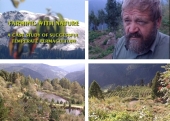
















David Wise, DaBearded1. Doing Permaculture on .5 acre in a suburban setting, in a arid shrub steppe climate.
 1
1




 2
2








rose macaskie wrote:
I have been thinking about what stalk_of_ fennel says and i have thought that maybe it would be more accurate to to change my title which is to say fukuoka's saying to "It is the earth not the sky that brings the moisture in the air to condensation point", though it would be a tremendous exageration as the humidity in the air condenses when cold bits of air meet warmer ones as well as for reasons that seem to have a lot to do with the earth to judge from changing rainfall paterns when we change the vegetation on the ground.
Warm air can hold more moisture than cold air so if ithe warm air is pretty saturated with moisture and it meets a cold front that cools it down, the moisture in it may be enough to condense into rain drops, which must be considered sky infllluenced rainfall








Brenda
Bloom where you are planted.
http://restfultrailsfoodforestgarden.blogspot.com/




rose macaskie wrote:
I have been whatching the video on you tube, Fukuoka in greece in which he says that rain comes from the earth not the sky and i thought that would be a good title for a thread here on these forums.
He says what bill mollison says that spores bring rain. I have to cheque that one out in bill mollisons videos and fukuolas. In biology i learnt that rain forms round a mote of dust and i have photos of cars heavily coverd in fine san dafter the rain in Madrid, you can tell its earth it is s andy colored or reddish earth colored, so spores or a mote of dust. I have always, it seems to me, heard that trees bring rain, I have made up my own reasons for this. I throw the theme out here for others to stuff their own bits of fact or comment into it. agri rose macaskie.
.




















Pakanohida wrote:
I think there is still something more we are missing. I read about Vicktor Schaubergers work and how when he found a spring that had stopped because people cut down vegetation he built a building over it and replanted the area. The spring came back quickly. (quick synopsis).
Pakanohida wrote:
Then again, the amount of moisture here next to my old growth stand is incredible. It continues to rain some 45 minutes more after any storm has passed inside that stand. Its incredible.








www.thehappypermaculturalist.wordpress.com




Get involved -Take away the standing of corporations MovetoAmmend.org




 1
1





|
Time flies like an arrow. Fruit flies like a banana. Steve flies like a tiny ad:
The new purple deck of permaculture playing cards
https://www.kickstarter.com/projects/paulwheaton/garden-cards
|





